Reflecting on the webinar “Youth Advocates Against Female Genital Cutting – A Conversation on Change”
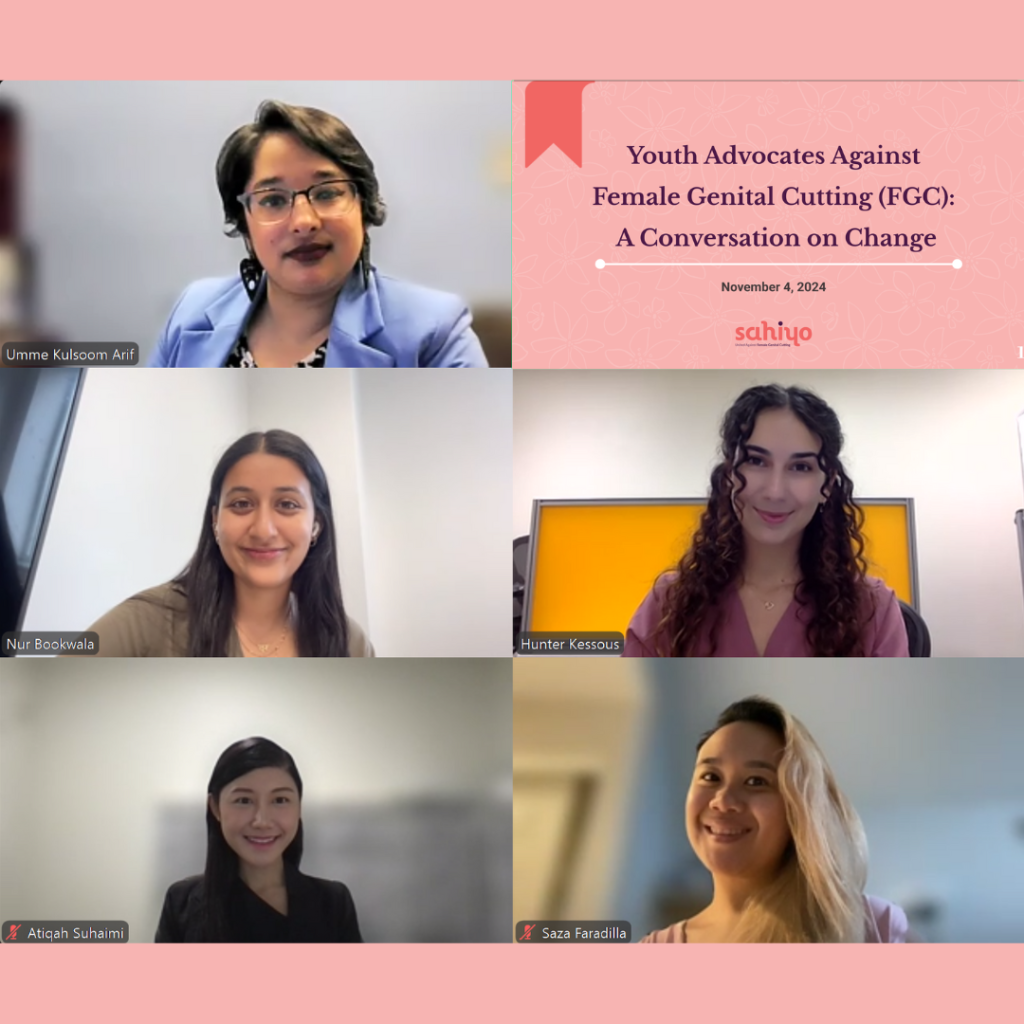
On November 4, Sahiyo U.S. hosted a vibrant webinar titled: Youth Advocacy Against Female Genital Cutting (FGC): A Conversation on Change, where a global community of advocates, educators, medical professionals, and human rights advocates gathered to share experiences and strategies for change. The diversity of perspectives in attendance highlighted how broad the movement to end FGC is. We heard from students who are passionate about women’s health, professors seeking to educate themselves on FGC, and activists working directly in their communities to end this harmful practice. Attendees gathered from near and far, with some folks tuning in from the city of Chicago and others from Singapore! Panelists at the event shared how youth are uniquely positioned to challenge entrenched norms and misconceptions around FGC. One advocate emphasized the importance of research and access to resources in academic institutions. Another spoke on the power of intergenerational engagement, highlighting how each generation brings unique strengths to the movement. Addressing the diverse cultural landscape, a third panelist discussed the significance of incremental progress in regions where FGC is deeply rooted in community social norms, stressing that every step forward, no matter how small, contributes to broader change. As one attendee described, the stories that were shared among the group were “beautiful, heartbreaking, and powerful,” while others thanked the panelists for their “bravery in turning betrayal into action.” For those who couldn’t join, here is a link to the recording of the webinar. We encourage you to watch and reflect on this incredible event alongside us!
Training Recap: An Introduction to Female Genital Cutting with AshaKiran
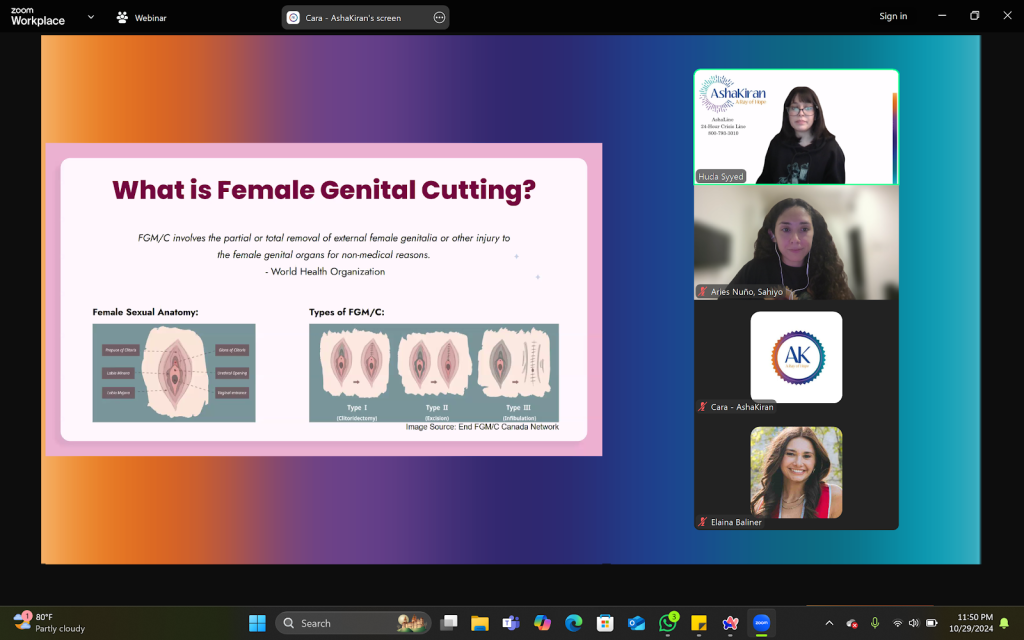
On October 29, Sahiyo U.S. partnered with AshaKiran, an Alabama-based organization, to host a Female Genital Cutting 101: An Introduction to FGC training. AshaKiran is dedicated to supporting underserved communities in crises such as domestic violence, sexual assault, and human trafficking born outside of the U.S. This training focused on building foundational knowledge around FGC and its impact on women and girls both in the United States and globally. Led by Sahiyo’s Training and Technical Assistance Coordinator Aries Nuño, Volunteer Huda Syed, and Development Intern Elaina Baliner, the session addressed FGC as a form of gender-based violence (GBV) that remains largely hidden and perpetuated by silence within communities. A key discussion point was Alabama’s unique position as one of the states without specific laws against FGC, emphasizing the importance of advocacy, policy change, and increased awareness in areas where legal protections for women and girls remain limited. Participants explored the need for trauma-informed, culturally sensitive services, as well as the role of enhanced data, research, and community engagement to strengthen prevention, protection, and support for those at risk of FGC. Through an open and compassionate dialogue, attendees gained practical tools to approach FGC with empathy and understanding, underscoring the importance of informed conversations in order to foster change. We are grateful to AshaKiran, our dedicated presenters, and all the participants for coming together to learn about the impact of FGC in the United States.
Staff Spotlight: Communications Assistant Kira Omans

Kira joins Sahiyo with a background in humanitarian advocacy, communications, community outreach, and storytelling. She completed her B.F.A. with a concentration in Stage and Screen Performance and a Communications minor from George Mason University. She also works as an activist fighting for adoptee rights. Kira is dedicated to Sahiyo’s mission of ending female genital cutting, and she is passionate about leveraging her experience to further this important message. When and how did you first get involved with Sahiyo? I first started working with Sahiyo in early October 2024! When I read about Sahiyo’s mission, it really resonated with me, as I already do a lot of advocacy work and community outreach. I was excited to apply for this position because it meant that I could use my previous experience to contribute to the important mission of ending female genital cutting (FGC) worldwide. What does your work with Sahiyo involve? As the Communications Assistant, I work with Communications Coordinator, Kristel Mendoza to create social media content and strategize campaign releases. We also provide support in organizing Sahiyo’s fundraising and events. I have enjoyed meeting Sahiyo’s team members and volunteers, who have all been warm and welcoming! How has your involvement with Sahiyo impacted your life? I have learned so much about the practice of FGC in the short time I’ve been with Sahiyo. Before I applied to this organization, I had no idea that FGC occurred in the US at all. I feel better equipped to help bring more awareness to FGC, and I’m more passionate about Sahiyo’s mission of ending FGC, and working toward creating a culture that values consent as well as the rights of children and women. I look forward to continuing to learn from survivors and activists as I continue to work with Sahiyo. What words of wisdom would you like to share with others who may be interested in supporting Sahiyo and the movement against FGC? Do not hesitate! Sahiyo fosters an approachable and safe community. There are so many opportunities, big and small, to get involved. I firmly believe that education is a vital first step toward actionable and sustainable change, so taking the time to learn more independently is also creating change. Any amount of support contributes to the mission of ending FGC and creating a safer world for women and children.
Reflecting on the “Female Genital Mutilation/Cutting in California – Past, Present, and Future” Webinar
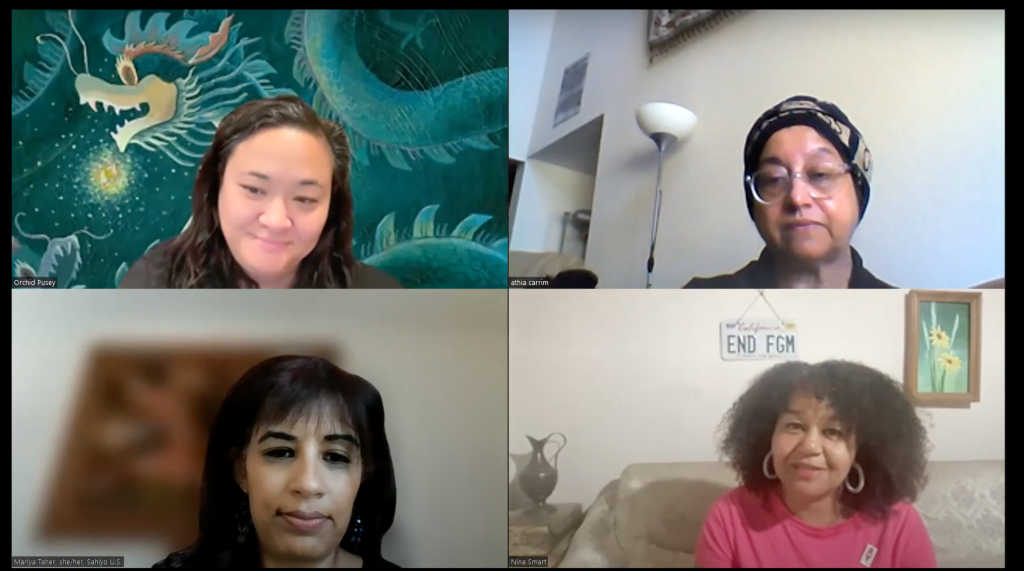
On October 11, Sahiyo in partnership with Equality Now, The U.S. End FGM/C Network, and the Greater Los Angeles FGM Taskforce held a joint webinar titled, “Female Genital Mutilation/Cutting in California – Past, Present, and Future.” The event was moderated by Sahiyo U.S. Executive Director, Mariya Taher and Shivagi Misra of Equality Now. The event brought together a panel of survivors, advocates, service providers, and community members who are already working on ending FGM/C in the state: Dr. Nina Smart and Athia Carrim of the Greater LA FGM Task Force, as well as Orchid Pusey of the San Francisco Asian Women’s Shelter. The speakers shared their histories of working in California, and in some cases globally, to raise awareness about the prevalence of FGC in the state. The conversation then turned to how the state could support advocates’ work by strengthening the current California FGC law, passed in 1996, to include components such as community education, cultural competence in care for survivors, and productive interactions with community members from practicing communities. As Shivangi Misra said during the event, “We can use the law for support, outreach, and healthcare.” The panel also highlighted the intersections of identities that survivors of FGC (for example, recognizing that an FGM/C survivor can also identify as gender-queer). This helps us recognize the need to push for a holistic approach to address survivors of FGM/C. The audience was very engaged, with many participants expressing their eagerness to dive deeper into the topic and sharing their personal experiences working with the issue in the state. We encourage you to watch the full webinar to hear more about the experiences of survivors and advocates, as well as learn what needs to be done while pushing for an updated law in California. [youtube url=”https://www.youtube.com/watch?v=HTAZ0vrd0cg”]
Reflecting on the NAPIESV ARP SA Grantees Gathering in Honolulu, Hawaii
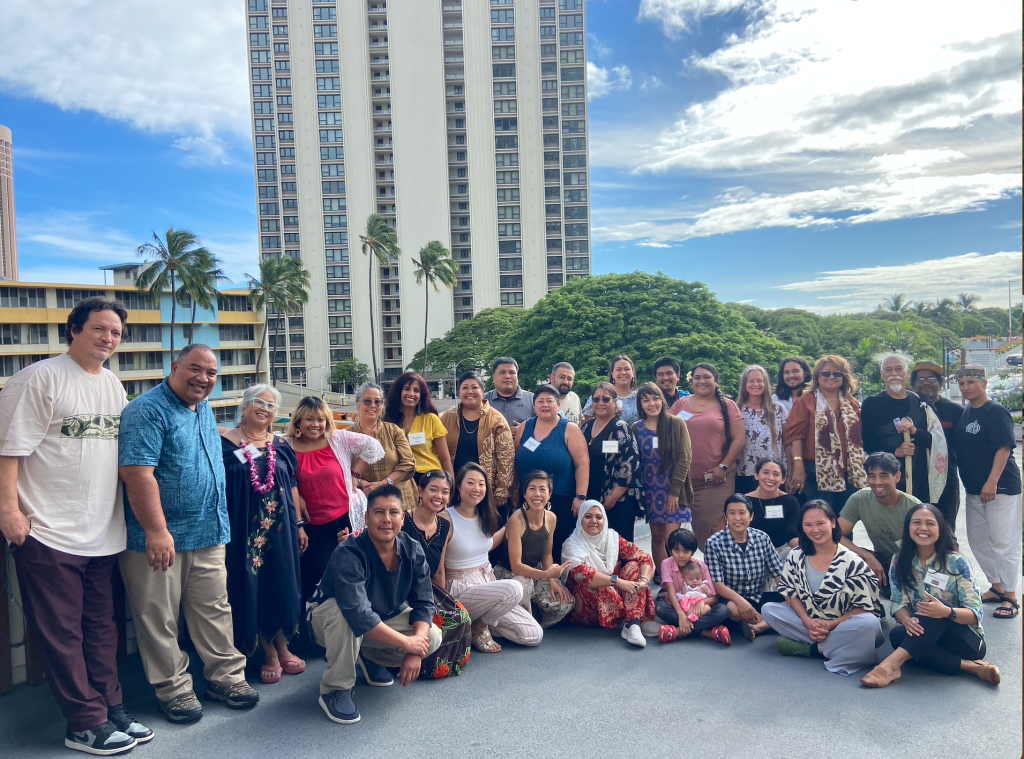
In September 2024, Sahiyo U.S. had the privilege of attending an event in Honolulu, Hawaii, hosted by the National Organization of Asians and Pacific Islanders Ending Sexual Violence (NAPIESV) for grantees who had received funding from the American Rescue Plan (ARP) to create culturally specific programming to address sexual assault in AAPINH (Asian American, Pacific Islander, and Native Hawaiian) communities. The three-day event was significant for Sahiyo, allowing the U.S. team to reflect on its Activists Retreat program, which – thanks to this funding – has now trained over 100 activists to date. During the event, the team reflected on and shared key milestones, including hiring Community Engagement Coordinator Samman Masud, hosting its first in-person Activists Retreat since the Covid-19 pandemic, and launching its first-ever retreat to include individuals from Asian, Pacific Islander, and Southwest Asian/North African (API-SWANA) regions and communities in 2024. (To hear more about attendees’ experience at past retreats, click here). Connecting with fellow organizations, each with their own story and approach, offered new perspectives and insights into how Sahiyo U.S. can better support AAPINH survivors and continue to foster meaningful change. Sahiyo U.S. is looking forward to planning our third annual Activists Retreat under this grant in February of 2025. (If you’re interested in attending, click here). A heartfelt thank you to the local organizations, Olohana Foundation and Hawaii CASA for welcoming everyone so warmly, sharing invaluable insights, and highlighting the unique issues impacting communities in Hawaii. To learn more about our Activist Retreat program, watch the video below! [youtube url=https://www.youtube.com/watch?v=l-sOB_fRe6A ]
Sahiyo U.S Executive Director Mariya Taher receives the 2024 Champion of Change Award
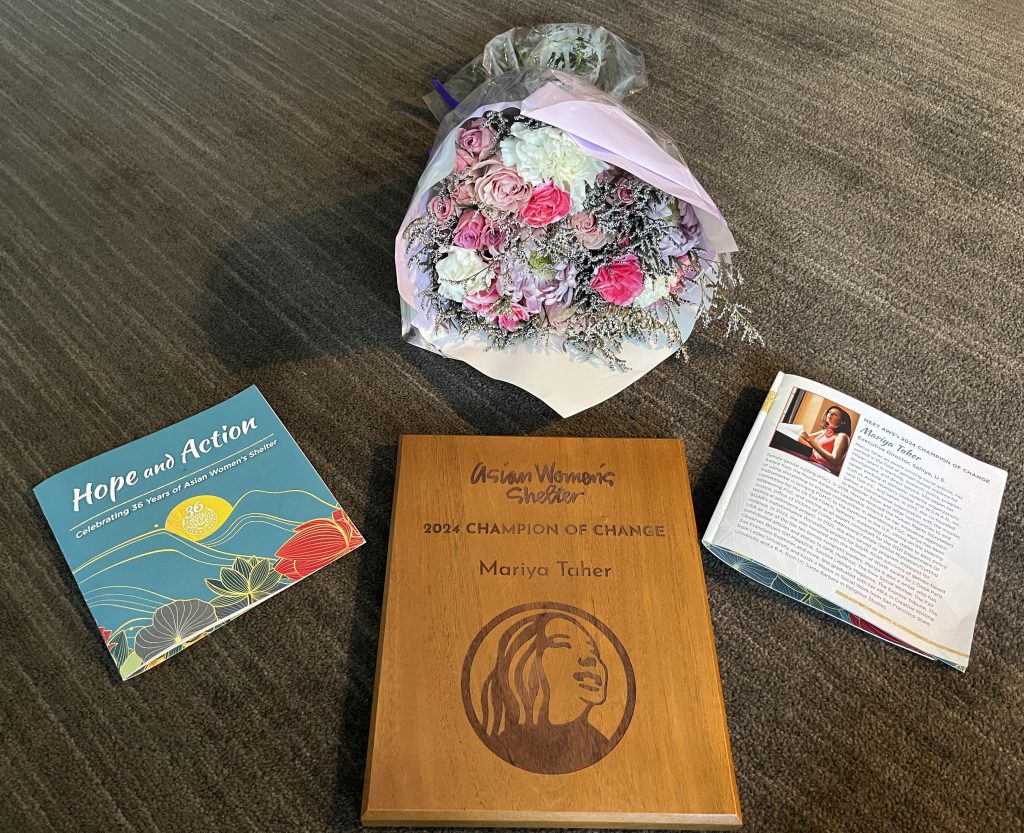
On October 5th, 2024, Sahiyo U.S. Executive Director Mariya Taher received the 2024 Champion of Change Award, during the annual Asian Women’s Shelter’s (AWS) gala, “Hope and Action: Celebrating 36 Years of The Asian Women’s Shelter” in San Francisco. This award is given to individuals working to end gender-based violence in their communities and in the world. As the Co-Founder and Executive Director of Sahiyo U.S., Mariya has played a key role in the movement to end FGC. Her work with state coalitions has influenced legislation, culminating in anti-FGC laws passed across the U.S., including in Massachusetts and Washington. She has brought the issue to the forefront of public discourse, raising awareness of FGC in the U.S. and abroad through outreach, training, and educational programs. “Receiving this recognition from the Asian Women’s Shelter at their annual gala is a huge deal for me. I was a volunteer with AWS after I graduated from my Master of Social Work program at San Francisco State University in 2010.” Mariya said, “Over the years, both my life and my work have kept me in touch with their organization in many ways. For the past 3 years, I’ve been working with AWS and Amy Hill, at Silence Speaks, to bolster our Voices to End FGM/C digital storytelling project in culturally specific ways, which has been such a gift. Who knew that years after volunteering with them we’d still be working together and building up the capacity of care for survivors of FGM/C in the U.S.” The Voices to End FGM/C program has been transformational, bringing survivors together in a safe space to tell their stories, heal, and connect. The only way we can create effective change is by having survivors at the table telling us what they need and how they want to see this practice end. Mariya’s work has done all of this and so much more, and all of us here at Sahiyo are thrilled to see her receive this remarkable award.
Join Us for an Inspiring Webinar: Youth Advocates Against Female Genital Cutting – A Conversation on Change

We are excited to announce an upcoming webinar that promises to be both enlightening and empowering: Youth Advocates Against Female Genital Cutting – A Conversation on Change. You, too, can join us for this important discussion. Date: November 4, 2024 Time: 12:30 pm ET / 9:30 pm PT Registration Link: https://bit.ly/FGCYouthAdvocacy Why This Webinar Matters This webinar recognizes the vital role of youth advocacy in addressing the practice of female genital cutting (FGC). Recent articles and studies have highlighted the significant impact of youth advocacy in working to end FGC. For instance, an article by Orchid Project reflects on International Youth Day and emphasizes how young advocates have pioneered innovative strategies to raise the awareness of FGC and enhance their advocacy skills. Similarly, organizations like Equality Now exemplify the transformative power of youth-led initiatives, emphasizing the commitment of young advocates to further challenge societal norms and promote an inclusive dialogue on critical issues. Despite efforts to end the practice, FGC still persists as a serious issue affecting millions of people worldwide. Engaging with youth advocates is crucial as they bring fresh perspectives and unwavering passion to challenge norms and drive change for the future. Our Motivation The decision to focus this webinar on youth-led efforts stems from a recognition that young voices are often underrepresented in discussions about FGC. We see this as a missed opportunity. Youth advocates bring a unique energy and perspective that are essential to challenging long-standing norms and practices, and their involvement can drive innovation and lasting change Here’s why we are particularly focused on supporting youth in the work to prevent FGC: Youth as Catalysts for Change: Young people possess a powerful mix of passion, creativity, and determination. They have the potential to challenge outdated practices and create meaningful change. By providing them with the opportunity to share their voices, we can channel their energy into addressing FGC more effectively. Education and Empowerment: Knowledge and confidence are the cornerstones of effective advocacy. This webinar aims to empower young activists by offering insights from experienced advocates who have a thorough understanding of the challenges and opportunities in the movement to end FGC. Event Highlights During this dynamic panel discussion, you will hear from youth advocates who are making a difference in their communities and beyond. They will share their journeys, innovative strategies, and the challenges they have encountered in their advocacy efforts. The session will also include interactive discussions that promote diverse perspectives and collaborative problem-solving. Why You Should Attend This webinar is more than just a conversation—it’s a call to action. By participating, you will: Empower Youth Advocates: Provide a space for young advocates to share experiences and personal strategies for raising awareness and creating change Promote Dialogue: Foster empathy, exchange diverse perspectives and generate innovative ideas for advocacy and community engagement, emphasizing the role of youth in advocacy efforts Build a Stronger Network: This webinar will offer valuable networking opportunities, connecting participants with like-minded individuals, organizations, and experts dedicated to ending FGC. Gain Valuable Insights into Effective Advocacy: You’ll learn from accomplished young activists like Hunter Kessous, Nur Bookwala, Saza Faradilla, Atiqah Suhaimi, and Umme Kulsoom- Arif. Register Now Don’t miss this chance to be part of a transformative dialogue and support the global movement against FGC. Click here to register and secure your spot in this essential discussion.
Sahiyo U.S. Joins Massachusetts Community Health and Healthy Aging Funds in 15.8M Initiative to address systemic barriers to health
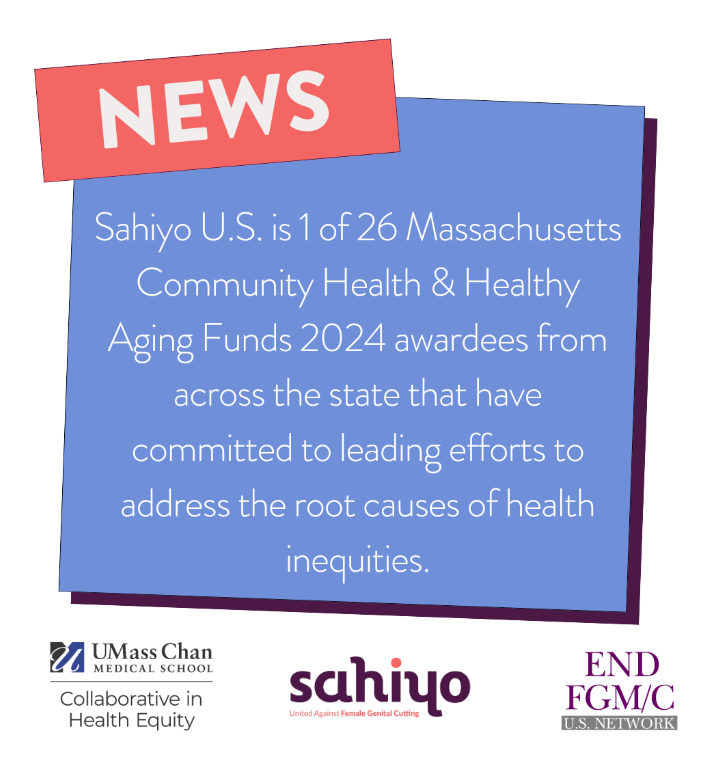
A Collaborative Effort to Address Female Genital Cutting and Advance Racial and Health Equity [Cambridge, MA, September 23, 2024] The Massachusetts Department of Public Health (DPH) has announced the 2024 awards of the Massachusetts Community Health and Healthy Aging Funds (the Funds). As part of these awards, DPH, the Executive Office of Elder Affairs (EOEA), and the implementing partner Health Resources in Action, Inc., will join with Sahiyo U.S. and 26 other organizations across Massachusetts and more than 40 of their community partners, including non-profit community-based organizations, municipalities, and coalitions. All of these organizations, including Sahiyo U.S. have committed to leading efforts to address the root causes of health inequities by disrupting systemic barriers to health and tackling institutional and structural racism head-on. During the pandemic, the need to support such efforts is even more imperative. In total ~$15.8M in grants will support 26 lead organizations and more than 40 of their partner organizations implementing strategies, ultimately impacting 458 cities and towns across the state. Sahiyo U.S. has partnered with the U.S. End FGM/C Network and UMass Chan Medical School Collaborative in Health Equity to develop systems of care and response for the prevention of female genital mutilation/cutting (FGM/C) and support for survivors in Massachusetts. Sahiyo U.S. Co-Founder and Executive Director, Mariya Taher, expresses her excitement about this initiative and the work ahead, “FGM/C is such an unaddressed issue in Massachusetts, let alone the United States. We’re excited about this project, because the funding allows us to really address this issue by providing us the capacity and time to gather those who are impacted by FGM/C and/or who work with impacted communities throughout the state and create a real community-based solution on how to address this topic, and how we can build a collaborative approach to both support survivors and work towards prevention of FGM/C amongst future generations. The goal of The Funds is to work with community partners to disrupt barriers to health, increase awareness, and address the impact of structural racism on population health, and create long-term, meaningful changes in population health outcomes. The Funds invest in initiatives in three core areas of focus including: Working on long-lasting, community-driven policy, systems, and environmental changes that will make it easier to lead healthy lives and which will reduce health inequities such as racial patterns of segregation in communities and a lack of affordable housing production; Organizing and coordinating Community Health Improvement Planning efforts which convene multi-sector partnerships to collectively set and address community health goals, and; Working to address policies and systems that increase opportunities for healthy aging. Recognizing the complex ways in which systems impact health, the investments will support a wide range of activities across the Commonwealth. Sahiyo U.S. aims to build a comprehensive network of stakeholders and service providers to implement a coordinated, systems-based approach to address how FGM/C is treated in Massachusetts; facilitate equitable access to healing and improve health outcomes for survivors of FGM/C, with a special focus on people of color; and prevent FGM/C among future generations by increasing resources to disrupt barriers such as lack of awareness among service providers regarding FGM/C and connected social issues. U.S. End FGM/C Network Executive Director, Caitlin LeMay shares, “This is an opportunity to engage in longer-term, intentional, cross-sectoral systems change that will directly reduce health inequities for survivors of FGM/C in the Commonwealth of Massachusetts, the very state where I call home. Being able to approach this work through various systems and different strategies, including healthcare provider training, policy advocacy, coalition building, increasing service delivery, and more, is really exciting.” The Massachusetts Community Health and Healthy Aging Funds were created in January 2017 when DPH completed a landmark revision of its Determination of Need (DoN) regulation, which authorized the creation of these Funds. DPH provides overall guidance to the Funds and Health Resources in Action, Inc. acts as a fiduciary and implementing partner. The Massachusetts Executive Office of Elder Affairs (EOEA) partners with DPH to support the Healthy Aging Fund. More information about the Funds can be found at https://mahealthfunds.org/.
Donor Spotlight: Brad Mazon

Brad Mazon, PhD, is a Bhaiyo volunteer, nonprofit consultant, husband, father, and an advocate against female genital mutilation/cutting worldwide. When and how did your involvement with Sahiyo first begin? My involvement first began I would say two or so years ago when I found Sahiyo on social media. I became actively engaged when I donated to the annual International Women’s Day fundraiser and Comedy Show. But I’ve been involved with the issue of FGM since 1988 when I was an intern at the U.S. State Department in Somalia. I have come in and out of working on the issue, through various organizations, so when Sahiyo and the Bhaiyo program came onto my radar about two years ago, I became a donor and have remained involved ever since. Why did you decide to donate to Bhaiyo, Sahiyo’s male engagement program? My time working in Somalia and my upbringing really influenced my decision to donate. I attended a conference in Mogadishu, Somalia. It was all women who had been impacted by FGM. This event made a huge impression on me because a lot of the women I met with reminded me of my mother. I was raised by a single mother and I have always been in awe of her strength and resilience. It was the same strength and resilience that I saw in women I met at the conference. I realized very quickly that had my mother been in a situation where she was cut, she likely would have never been able to provide for me and for my family the way she did. I began to understand how FGM impacts women not just physically but also psychologically and socially. It wasn’t that these women weren’t as smart or as motivated as my mother was – it was that the opportunities to thrive had been taken from them by the patriarchy that surrounded them. I also understand that the impacts of FGM are different in different contexts. Being cut in Somalia may be different from being cut in the American Midwest, but…being cut anywhere is a violation of women’s autonomy and an act of patriarchy. Why do you feel it’s so important to support male engagement and voices within the movement to end FGM/C? There’s no sex that’s greater than the other. I believe that I am an anti-patriarchy and feminist man. At the end of the day, as I have gotten older and have become a father and now a grandfather to a little girl, I have realized – and certainly living in America right now – how strong the patriarchy is on so many things. I resent in my heart, mind, and soul that men think that they have some sort of power over women. I wanted to do something as a man, coming from a male perspective that could combat that false narrative. That’s why Bhaiyo was so exciting to me. On my first call with the group, it was with men from around the world who were doing the frontline work of going into villages and speaking to people about the dangers of FGM [and] of what it could do to their little girls. I was thrilled to be a part of that work through donating. But at the same time, I was very mindful, and still am, of my white privilege and also my Western privilege in the same sense. And when I say privilege, I mean it in a structural and economic way, because I know there is beauty, wisdom, and knowledge in Africa and Asia. I wanted to be mindful of that as I engaged in conversations with these male activists who I have great respect for. But I also wanted them to be mindful that while it’s important for men to be in the conversation, women still need to be supported to speak out at an equal level. We can do that in many ways, big and small. I’ve started changing the hashtag I use in posts from #menendFGM to #menandwomenendFGM. What I’m trying to say here is that while it’s great that we’ve got men involved, let’s not do it in a way that pushes women out. How would you like to see Bhaiyo and Sahiyo grow? I think in terms of Bhaiyo, the main thing we need is more men involved. I’ve tried to do this in my circles by sharing the survey on my Linkedin and with various people in my life. I’m always shocked at how many men aren’t involved. I also feel like we need to make FGM more well-known in the U.S. through any means necessary. We need some celebrity to get men fired up about this. Or even more high-level people in our government talking about FGM. But I’m also under no illusions that I’m doing the hard work. I know those gentlemen on the frontlines going from village to village spreading this message who are the ones pushing this work, and they have my full support and respect. I also know that getting this issue into the rooms of power in the U.S. and the world beyond is key to this movement, and we can do that by talking about FGM loudly. Why do you think others should donate to Sahiyo? I think more people should donate to Sahiyo because people don’t realize that FGM is an issue that has a tremendous impact on the world. It’s shocking to me how FGM is such a quiet menace not only to survivors but also to men who are affected by it – with their wives and sexual pleasure – or the ability to have children. I’m just surprised how it’s a form of violence, yet it’s one that seemingly the world is not comfortable talking about publicly. I also want people to understand that FGM is a form of domestic violence. In the same way that we talk about abuse and other harms against women, FGM needs to be included in those conversations. And we
Reflecting on a Screening of The Beginning, a Film Directed by Sahiyo Co-founder Insia Dariwala

By Insia Dariwala On July 19th, Population First/ Laadli, along with Sahiyo India and Equality Now, hosted a screening of South Asia’s first fiction film on FGC titled, The Beginning. Produced by Equality Now, the film was written and directed by award-winning filmmaker and Sahiyo co-founder Insia Dariwala. The film adopts a survivor-centered approach that highlights the trauma caused by FGC to demonstrate how and why the practice must end. The story bravely highlights one woman’s journey to end the generational trauma caused by the cut and centers around the call to action: “The cut can stop with you.” The film is currently being screened at various festivals around the world and has already won four awards and three official selections globally. A large group of attendees from different walks of life attended the screening, including eminent personalities and theater veterans like Dolly Thakore and Mahabano Mody Kotwal, famous for their adaptation of ‘The Vagina Monologues’ play, as well as award-winning filmmaker and LGBQT rights activist Anirban Dhar (Onir). Actors Shishir Sharma, Sujata Mehta, Hunar Gandhi, and Rashmi Sachdeva, were also in attendance along with other activists including Majlis Legal Centre Director Audrey D’mello, leading gynecologist and Medical Director of NPA India Dr. Suchetra Dalvie, FGM/C survivor and medical practitioner Dr Eliza Kapadia, Dr. Julie Thekkudan of Equality Now, Program Director of Population First Yogesh Pawar, Sahiyo co-founder Aarefa Johari, and many others. The screening was followed by two-panel discussions on using the creative medium to bring about positive change and how these types of media can inspire necessary conversations. Panelists discussed Sahiyo India’s continued efforts to address FGM/C and stressed the need for a law banning FGM/C, as well as facilitating a continuous dialogue within communities to end this practice. The audience was extremely moved by the film and spoke about how it holds the potential to strengthen awareness of FGM/C in the country. The filmmaker Insia, whose main objective for the film is to motivate younger community members to question and end the practice of FGM/C, says she was elated to receive quite a few heart-warming messages from the audiences after the screening. But the one message that deeply touched her was from a Mumbai-based FGM/C survivor Sarah Shabbir* who wrote: “My name is Sarah and I recently came across your work through an invitation for your film screening. I currently work at an organization where we focus on rehabilitating survivors of violence. I was deeply moved by your impactful efforts in addressing issues such as child sexual abuse and FGM. As a survivor myself, having experienced both, I feel a strong connection to your work and am eager to learn more about your journey. It would be an honor to connect with you someday and get to know more about your work. Unfortunately, I couldn’t be there for the screening but my colleagues who did attend gave me amazing feedback and I would love to attend another screening whenever it happens.” *Name used with consent.
